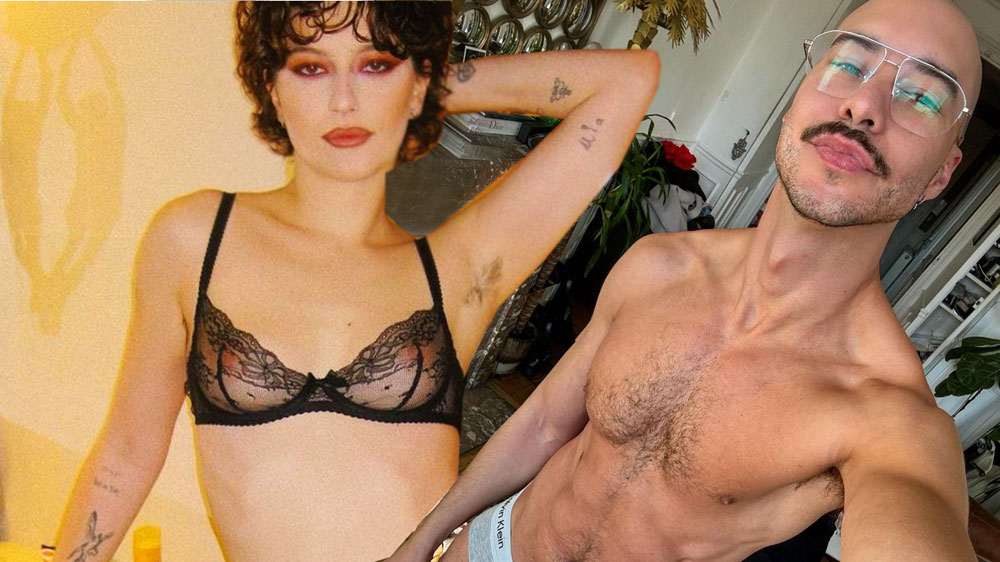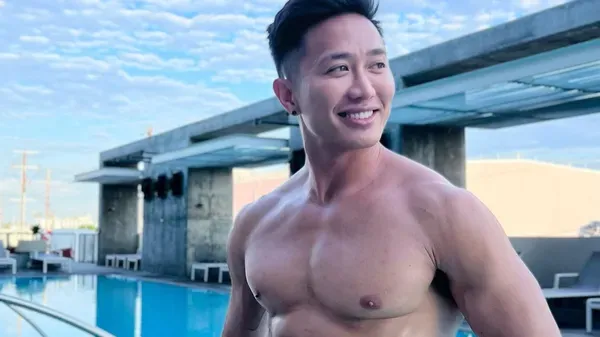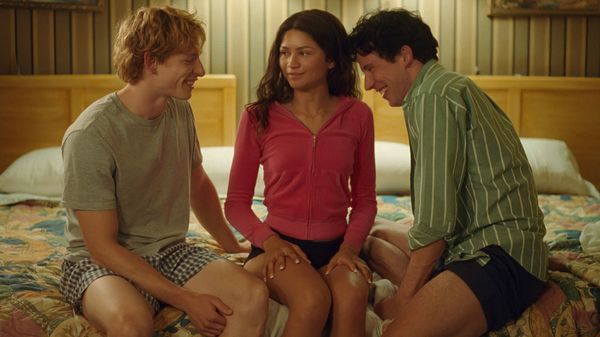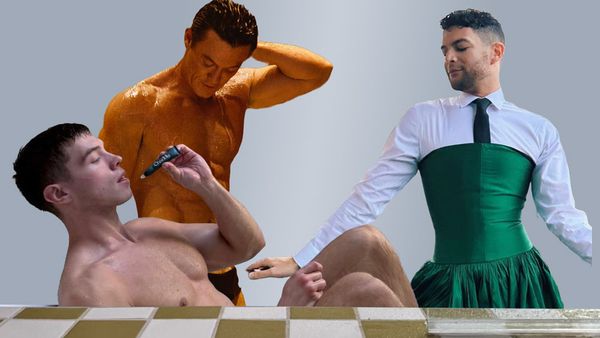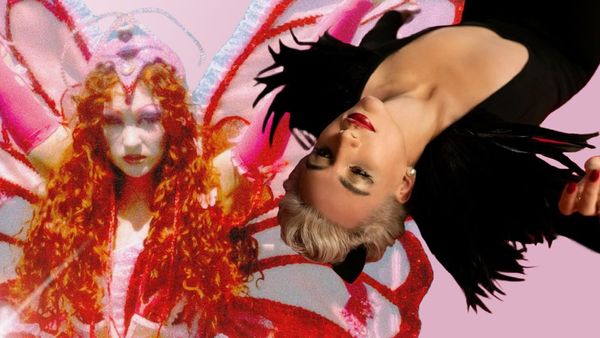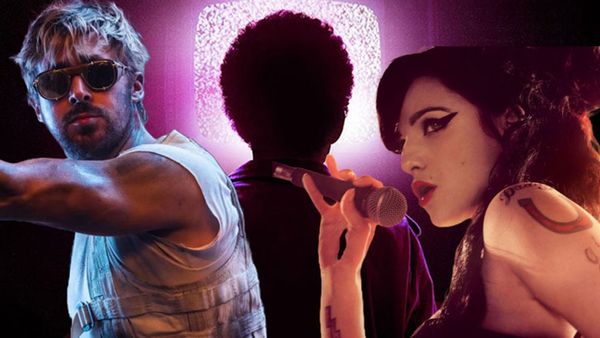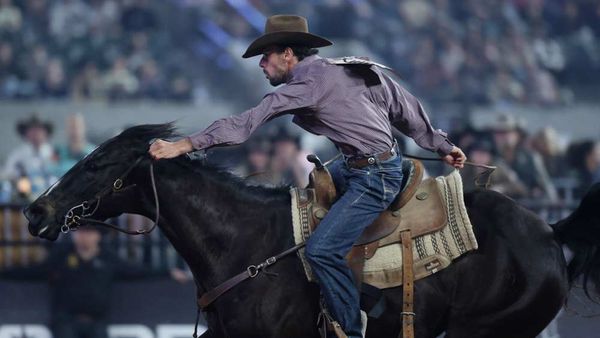October 2, 2011
Will McGarrahan :: He keeps going and going... one play to the next
Kay Bourne READ TIME: 14 MIN.
"Next Fall," Geoffrey Nauff's provocative gay play at the SpeakEasy Stage, concerns an unlikely couple: Luke, a gay Christian in his 20s who believes in the Rapture, and Adam, a 40-ish writer with no strong religious convictions. Throughout the play they clash over their differing beliefs, that is, until a random accident puts their relationship in jeopardy and puts Adam in an uncomfortable position with Luke's conservative parents, who don't know their son is gay.
In the production, Adam is played by Will McGarrahan, one of the most well-respected and hard-working actors in Boston theater. Just look at his accomplishments over the past year. Last autumn he played James Tyrone, Jr., the booze-sodden, "third-rate ham," in the Central Square Theatre's production of Eugene O'Neill's epic "Moon for the Misbegotten." He followed that by playing multiple roles in Bill Cain's taut Iraqi War drams "9 Circles" in an acclaimed production by the Publick Theatre. Before he could catch his breath, he was in something completely different - the frothy musical "The Drowsy Chaperone" at the SpeakEasy Stage where he stole the show in his droll performance as the musical theater-savvy narrator, known as the Man in the Chair. Now he's back with the SpeakEasy in Nauff's acclaimed drama, which runs through October 15.
It was twelve years ago that McGarrahan, an Albany native/BC-educated actor, made his Boston debut in the lead role of Willam Finn's "A New Brain" for the SpeakEasy Stage. In the show, McGarrahan played composer Gordon Schwinn who discovers he has a life threatening congenital brain defect (the story was based on Finn's experiences). He immediately impressed critics and audiences.
"One saving grace of the production is the lead performance by Will McGarrahan, who has a strong voice and a perpetual glint in his eye that helps him connect with the audience," wrote Robert David Sullivan in the Boston Phoenix. "Reminiscent of a young Robert Morse, McGarrahan easily and believably alternates between panic and bemusement at his situation. I kept wishing he'd throw away the script and launch into his favorite Broadway tunes for an hour or two."
McGarrahan came to Boston for the show from Seattle at the assistance of SpeakEasy's artistic director (and college chum) Paul Daigneault. After the show closed, he returned to Seattle only to decide to relocate to Boston some time later. Since then he's been a staple on Boston stages, appearing in such productions as "Ruthless!," "Five by Tenn," "A Class Act," "Company," "The Mystery of Edwin Drood," "The Last Sunday in June" and "Some Men," at the SpeakEasy Stage. "The 25th Annual Putnam County Spelling Bee," "Grey Gardens," "November," "Souvenir" and "Dirty Blonde" a the Lyric Stage; "The Wrestling Patient" at Boston Playwrights Theatre (co-produced by SpeakEasy Stage and FortyMagnolia Productions); "Buried Child" at the Nora Theatre Company, and "The Wind in the Willows" and "Happy Days" at the Gloucester Stage.
EDGE recently caught up with McGarrahan for a conversation about "Next Fall," his career and the serendipitous route he took to moving to Boston and his career here.
Incompatible love match?
EDGE: My initial take on "Next Fall" is that it is a story about a love match between two men who too often focus on their differences while ignoring their mutual affection for each other. In the end, their arguments really don't matter. Is this pretty much how you see the story?�
Will McGarrahan: Yes, I think that's about right. On one level, one universal level, it's about how we can focus on how things aren't working in a relationship and not acknowledge how much things are working. Of course, in an even bigger way, the play encourages us to all appreciate all the great things we have in all our lives.
�
EDGE: Did you like the story when you read it?
Will McGarrahan: I love the themes that the play explores and I love how the story unfolds... how Geoffrey Nauffts weaves the "present" story with the flashback story.
�
EDGE: Does liking or disliking a narrative matter to you as an actor?
Will McGarrahan: In general, I�suppose I'm more interested in characters than the narrative, per se.�The flip side to that is if I find the characters interesting, chances are I'm going find the story and theme interesting.
Best foot forward
EDGE: Have you ever acted in a play you thought was less than commendable?
Will McGarrahan: I can't think of�a time when I entered a�theater experience where I didn't come out better on the other side.�Whether it's the play itself, or the relationships and friendships developed or even the lessons learned.�You know, HOW we work on plays doesn't vary so much. You're always putting your best foot forward. How�OTHER people see the end product is the variable.
�
EDGE: "Next Fall" is also a story about coming out or not to a parent, in this instance who would find the relationship offensive on religious grounds. As an out actor, do you find this an important issue for a playwright to explore?
�
Will McGarrahan: What I think many of us forget living in a big city in the Northeast is that gay people are everywhere. I imagine the actual percentage of gay people born throughout the world doesn't vary from place to place. However, how�"out" people are allowed to be varies greatly. There are a lot of places in our country where it's a lot harder to be gay. I think it's always good to be reminded of that. It's a big world out there. Sure, gay people can find their ways to the big city where being yourself is not such a big deal, but not everyone does that. And, as the play points out, our families are coming from lots of different places, too.
�
EDGE: Do you find Adam, who is out and agnostic, credible?
Will McGarrahan: Listen, we all have different ways we are out. Out is not just one thing. How we are out with our families, or out with our friends, or out with our neighbors, or out with our co-workers, varies from place to place and from situation to situation. I think Adam seems more "out" because in the play, we see they ways that Luke is NOT out.
�
Relevant issues?
EDGE: What other issues raised in the play do you find significant, such as when Adam is initially barred from entering Luke's hospital room?
�
Will McGarrahan: There are lot of issues that arise in the course of the play. I think there can be some really interesting conversations that can be had after watching "Next Fall." What's nice about the play is that Geoffrey Nauffts constantly shifts your point of view throughout. He makes all the characters sympathetic and believable.
�
EDGE: You came to Boston from Seattle. Are you from there originally?
�
Will McGarrahan: No. I'm originally from Albany, NY. My parents and many of my siblings are still in that area.
�
EDGE: In addition to be an actor, you sing and play the piano, both skills you've put to good use in "Grey Gardens". Have you done much cabaret?
�
Will McGarrahan: No. I really haven't done that much cabaret, per se. I've done a little. I've found that in Boston I've been able to work on a variety of projects in a variety of ways.�Although I think of myself PRIMARILY as an actor, certainly playing the piano and singing has come in handy, whether it's performing or working behind the scenes.
Retiring characters?
EDGE: You're really good at playing retiring figures who nonetheless stand out for the audience. How do you go about achieving that contradiction of the character's personality versus his significance in the drama and in the eyes of the audience?
�
Will McGarrahan: I'm not sure if I understand your question. I guess I've never really thought of any of the characters�I've played�as "retiring figures." Characters, like real people, have wants and needs and desires. And that makes us all act in different ways.
�
EDGE: When did you discover a passion for the theater and for acting and were you encouraged in this pursuit?
?
Will McGarrahan: I started acting in actual plays in middle school. I always liked music though it took me a while to find the right instrument for me. Plays, musicals, singing, piano, band - I did all of that in middle school and high school. Of course, before that, even as far back as kindergarten, I remember being in skits, as we all were. We all were exposed to music and theater back then. I hope kids still are. My family (my parents, grandparents, siblings, aunts) have always shown a great deal of support. And they continue to.
EDGE: Where did you go to college?
Will McGarrahan: I graduated from Boston College. Originally, I was just a Speech Communications major, but I think around my junior year I added a Theater major. The great thing about Boston College is that we did it all in the theater department. We directed, we acted, we sang, we built sets, sewed costumes, collected props - we weren't pigeonholed too early, so we felt like we could do it all. Who knows if we were any good at any of it, but still it made feel like we COULD do it."
Journey to Boston
EDGE: Why did you choose Boston as the town to go to college?
Will McGarrahan: I'm a little embarrassed to say how that all happened. When it came time to start looking for colleges during high school, I was a little clueless. My Aunt Kay and her family lived in Newton and I liked visiting them, so I had in my mind Boston was a nice city. I also knew I wanted - or at least assumed SHOULD - go to "college". So while looking at brochures in my high school guidance counselor's waiting area - there was a shelf with all the booklets alphabetized - I went to "B" for Boston.
Once I found "Boston" I chose "College" since that's where supposedly I was going. Boston College's brochure had a picture of the Gasson Hall tower with lots of trees with orange autumn leaves - it looked pretty, like what I thought college was supposed to look like. I applied early admission and got in. Never applied anywhere else. Sad, but true.
Off to Seattle
EDGE: How did you end up in Seattle?
Will McGarrahan: After college, I spent a season at Capitol Rep in Albany, interning - assistant stage managing and understudying - and went right to New York as soon as could. I went from sublet to sublet for about a year and a half and I did get cast in a production of "Biloxi Blues" which took me out of the city for several months, but I basically had no idea how to gain access to theater jobs. I knew it was all happening somewhere, but I didn't know how. I also didn't feel like I had much of a life.
I spent all my time making money for rent and food and woke up every morning wondering how to get an acting job. When I returned from "Biloxi Blues," I was bartending at the lobby bar of the Gershwin Theater and - kinda out of the blue - decided I would move to Seattle. I had never been there, didn't know anyone there - but I had spent a couple months in Dublin after college and I guess I thought it would be like Dublin. It's not. I lived at the Seattle Y for a couple weeks and eventually started going to auditions out there. I didn't go to Seattle to act - I mostly went to have a life - but because acting wasn't the "goal" I think I probably auditioned better. It wasn't as important. I loved Seattle. I loved the city and people and the vibe and stayed for a long time.
In 1999, Paul Daigneault, who I knew from Boston College days, sent me an email asking if I'd be interested coming out to Boston to play Gordon in William Finn's "A New Brain." Although I knew Paul had a theater company, I didn't really know much about SpeakEasy at the time. But it was a good part and I love William Finn stuff, so I came about for rehearsals and the run. A New Brain" was a very heightened experience for me. It was a big ol' love fest in the cast and several people started encouraging me to move to Boston.
I returned to Seattle for a couple of years, but eventually just packed everything up in a U-Haul and drove cross-country. All of my family was on East coast at that point, so it was gonna be nice being closer to them. But certainly, the people I had become friends with in Boston were really supportive about the whole move. I slept on Kerry Dowling's floor for a couple weeks before I found an apartment. And they all moved me in and out of storage places and apartments in the those early days - seemed like every couple of weeks. That was the end of summer in 2001. I've been here since.
Never was 'in'
EDGE: Do you have any dream roles?
Will McGarrahan: That's a common question that actors get asked, and honestly, I don't really have any. Guess I don't really think about it like that. Maybe if I was actually producing plays, I'd think in that way, but I'm not choosing seasons. I find out what the seasons are at theaters, see if there's anything that I'd be right for and pursue it.
EDGE: Has being an out actor impacted your career in any way?
Will McGarrahan: It's not like I came out. It's not like there was a time when I was in, professionally. When you get interviewed, sometimes you're asked if you mind being identified as gay. Early on, I said it was fine to talk about. If my acting career has been affected by it, I couldn't specifically say how or when. I'm sure it has. But that's not really my issue to worry about. Now, I have no idea what it would be like to be an actor in L.A. I'd assume it's more difficult to be out when there's much more at risk. But gay people always have to deal with those issues - all gay people - not just actors. Hell, all PEOPLE have to figure out how to present themselves in the world. I guess it's a little more complicated when you're gay. I hope by being out, it's just one more question that's off the table. I don't think being gay is what defines me as an actor or a person. It's ONE of the things. I also have brown hair and green eyes.
"Next Fall" runs through Oct. 15, in the Roberts Studio Theatre in the Stanford Calderwood Pavilion at the BCA, 527 Tremont St. in Boston's South End. For more info, including ticket prices and discounts, you may phone at 617-933-8600 or visit the SpeakEasy Stage Company website.

